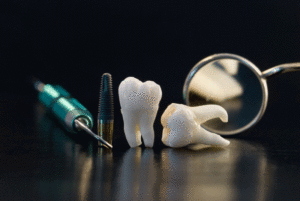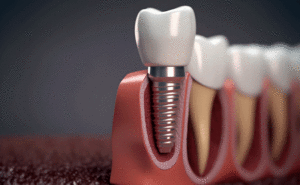Thanks to the use of anesthetics and sedation, getting a crown is not a painful experience for the majority of patients. The tooth being restored is numbed before the work begins and any discomfort post-procedure can usually be handled with aspirin or ibuprofen.
Why Get a Crown?
Your dentist might recommend a dental crown procedure for several reasons:
- A weak tooth that needs to be held together.
- An extremely discolored tooth.
- You requested a cosmetic procedure to improve your smile.
Other conditions that call for a crown include excessive wear of teeth, broken cusps, and the need to repair spaces left from missing teeth.
The Dental Crown Procedure
A dental crown procedure has traditionally been done in two visits. Caven Dental Group employs advanced technologies that allow for digital ceramic restorations in one appointment. During a dental crown procedure your dentist:
- Inspects the tooth to ensure it can support a crown.
- Files the tooth down to prepare it for the crown placement.
- Takes an impression of the prepared tooth and chooses the right shade the lab technician should use when making the permanent crown.
After the new crown is placed, your dentist inspects it for proper fit, bite, and smooth margins. The crown is then cemented with a permanent dental glue or cement.
Reasons a Dental Crown Might Hurt
It’s not unusual to experience slight discomfort after the procedure but if you experience intense pain or pain that lasts longer than a week, your dentist should be consulted for possible further treatment. The most common causes of post-crown pain are:
- The crown doesn’t fit right. If the crown is slightly high or tall, biting down or chewing with it can cause discomfort or pain.
- An inflamed nerve that requires a root canal.
- Sore gum tissues which can usually be alleviated with over-the-counter pain medications.
- Teeth grinding. If you normally suffer from bruxism, or teeth grinding, you could irritate the new crown. Possible treatments include a mouthguard, one of the most effective ways to treat any case of bruxism. Similar to athletic mouthguards, a dental version is made from a harder material and is custom fit to your mouth and jawline.
How Long do Dental Crowns Last?
Though they’re still subject to fractures and cavities, crowns generally last from 10 to 20 years. It’s important to take care of your crown the same way you do your natural teeth. Daily brushing and flossing as well as regular oral checkups help prevent having to replace a crown too frequently.
Talk to Your Dentist About Whether a Crown is Right for You
Porcelain crowns are a great option for people who want to correct cosmetic tooth imperfections or strengthen severely damaged teeth. Thanks to new dental technologies, the dental crown procedure is more efficient and comfortable than ever before.
Caven Dental is dedicated to providing our Jacksonville patients with the healthiest, safest, and most comfortable crown placement procedure available. To learn more about dental crowns, schedule a consultation with us today. We’ll help you decide if a crown is the right choice for you and go over all the cosmetic dentistry options available. We’re sure one of them can give you the bright and beautiful smile you desire.



